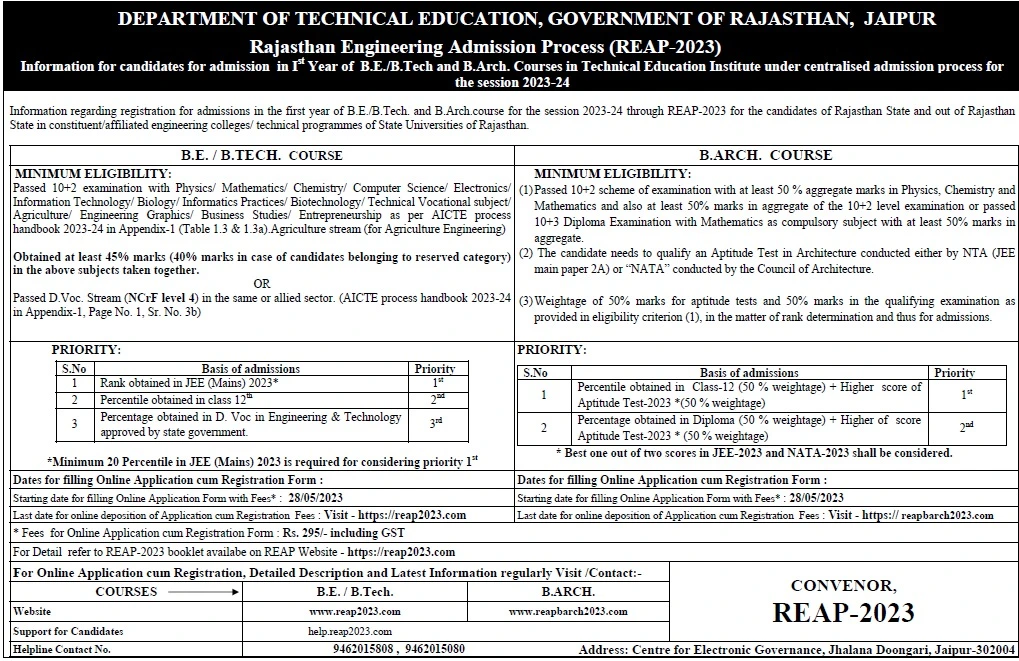

About the Department:
Electrical Engineering is a fascinating and rewarding field of study with many opportunities to solve key engineering problems. The Electrical Engineering Department at Arya College of Engineering - ACE inculcates in the students’ skills to understand, apply and analyze the underlying electrical principles through comprehensive curriculum of Electrical Machines, Electrical and Electronic Network, Control and Power Systems etc.
It is fascinating due to its government-job employability specifically in the Power/Energy sector. The graduates of the department venture out for a wide range of organizations including reputed MNC's like Torrent Gas, Cape Electric India Pvt. Ltd., Desire Energy Solutions, Pinnacle, Wipro, Tech Mahindra Etc. PSU's (PGCIL, BHEL, BARC, etc.), Armed Forces and Indian Engineering Services (IES).
The department has well qualified & experienced faculty. It nurtures the students so as to perform at high academic level. State of the art laboratories provide hands-on training to the students of Electrical Engineering. Special classes are also arranged for good understanding of the complex subjects. Classroom teaching is supported by video lectures and PPTs. The Department of Electrical Engineering has an advisory committee from amongst the teaching members, which meets at least once in a semester to review and evaluate performance of the department and offer advice in needed areas. Arya is one of the . top Electrical Engineering colleges in Jaipur.
Vision And Mission:
Vision: To be recognized as a premier department of electrical engineering, by promoting quality education, specialized knowledge in the field of electrical engineering along with interdisciplinary awareness thereby nurturing talented professionals who are equipped to meet the dynamic challenges of the global economy.
Mission:To provide enriching academic environment that enhances the teaching-learning process, enabling students to acquire in-depth knowledge and practical skills in electrical engineering, while nurturing creativity, innovation, and develop students for their superior employability, to pursue research and higher studies.
Message By HOD:
Engineering plays a pivotal role in shaping the future of technology and innovation. It encompasses a broad spectrum of disciplines, from power systems and electronics to telecommunications and control systems. We are making best efforts to produce highly trained and capable engineers who can take up the challenges of the real world. Our major emphasis of imparting technical training to encourage curiosity and innovativeness among our students and lay a foundation from where they can acquire quick learning ability and adaptively with the fast-changing needs of the industry.
Our department consists of various laboratories equipped with the new technological set ups giving the scope to all students having a hands-on experience individually, which will increase their confidence to face the practical problems in the field of Electrical Engineering. The department comprises of best of faculty from industries and academia to help bridge the gap and groom the best talent for the industries.
We continue to play a leading role in our discipline which leads us towards creating innovative and effective professional graduate community. I extend my warm wishes to all budding Electrical Engineering.
HOD, Electrical Deparment
State of the Art Labs:
The department has following well equipped laboratories which not only fulfill requirement of RTU curriculum but also provide ample opportunities to the students to carry out their project and seminar assignments as well as to undertake any research work:
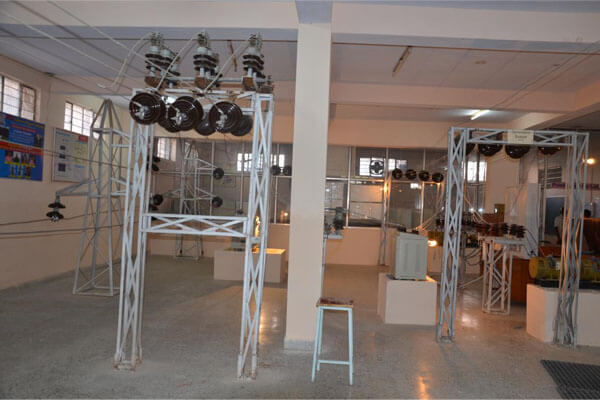
High Voltage Lab
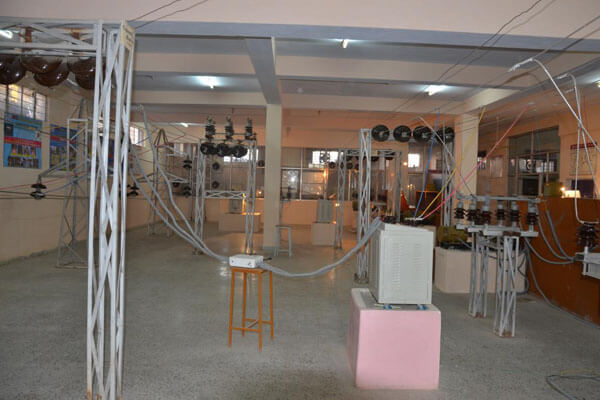
Power Electronics Lab
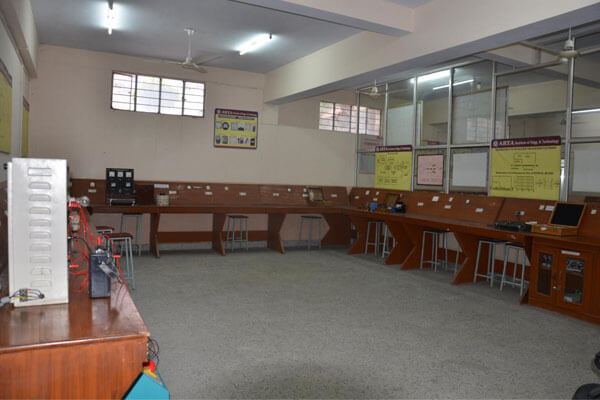
Advance Power Electronics lab

Basic Electrical Lab
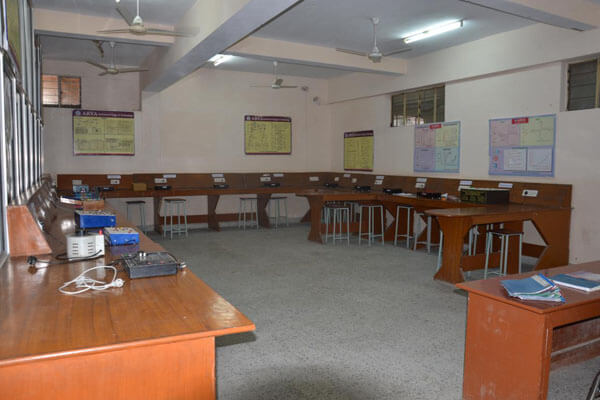
Microprocessor Lab
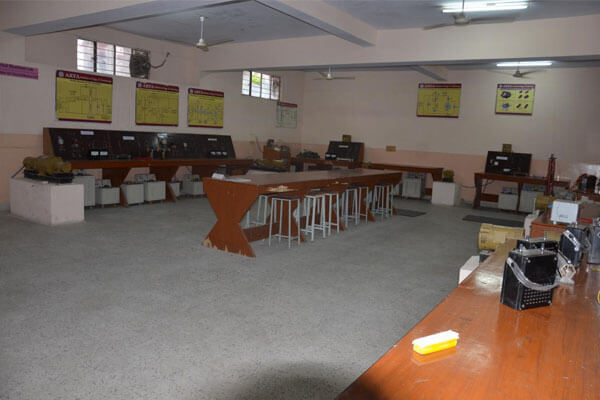
Electronics devices and Circuit Lab

MAT Lab for Control Systems and PLC Circuits

Electrical Drives and their Control Lab
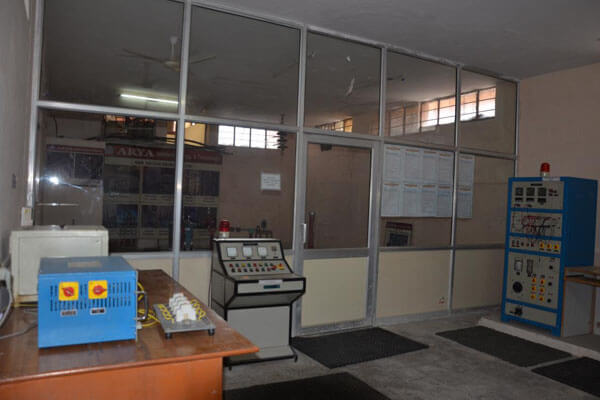
Digital Electronics Lab
Syllabus & Scheme
| S.No. | Description | Download |
|---|---|---|
| 1 | III and IV Semester | View |
| 2 | V and VI Semester | View |
| 3 | VII and VIII Semester | View |
Department Specializations:
a) Focus Area:
b) Digital Notes:
The Department has digital notes with videos as well as hard copy Notes on all the subjects relevant to RTU syllabus. These notes have been prepared by highly experienced faculty. The Digital notes can be found on "aryanotes.com"
c) Student Development (SDC) and Campus Recruitment Training (CRT)s:
SDC is a group of professionals that provides regular inputs for complete development of students and making them prepare to face competitions and future challenges.


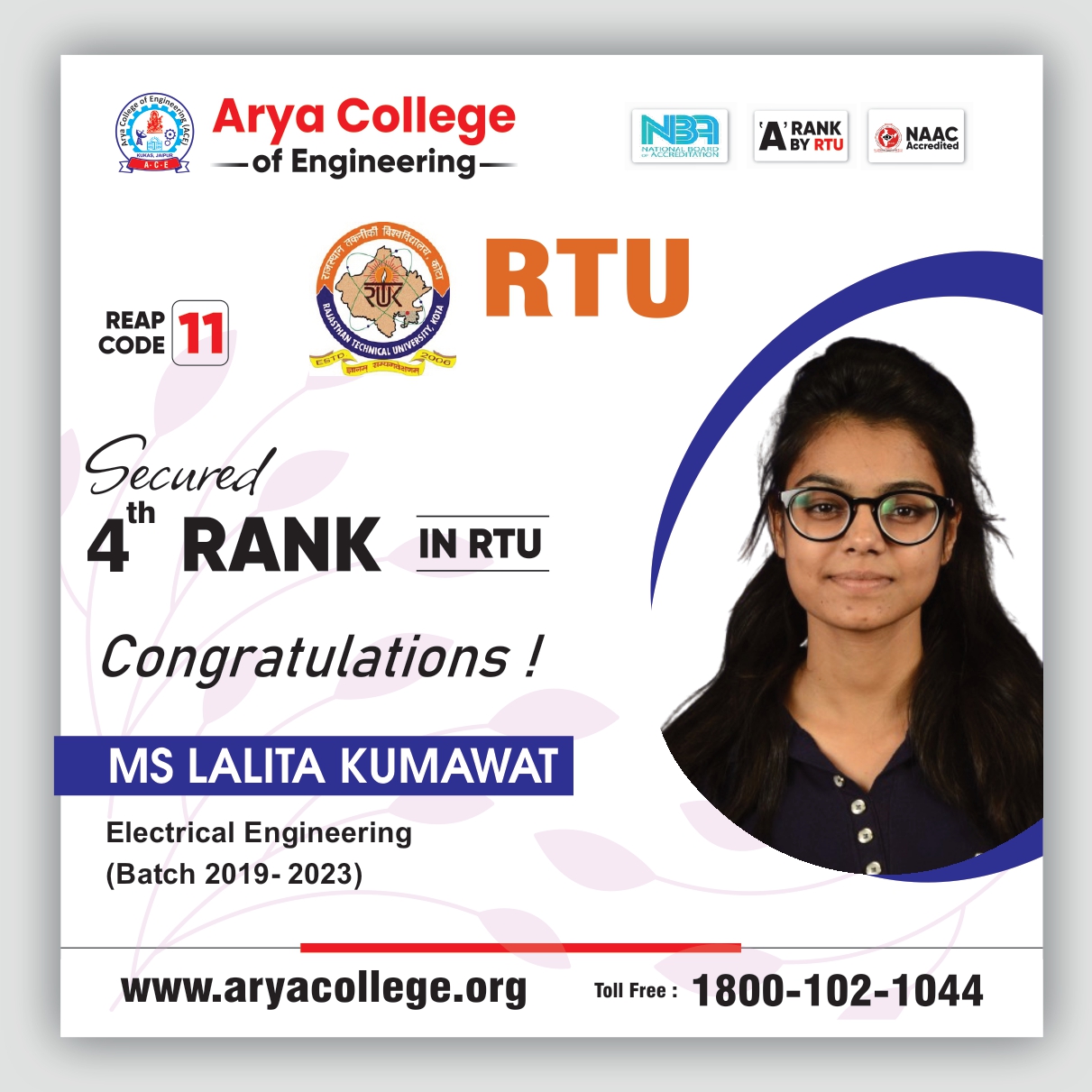



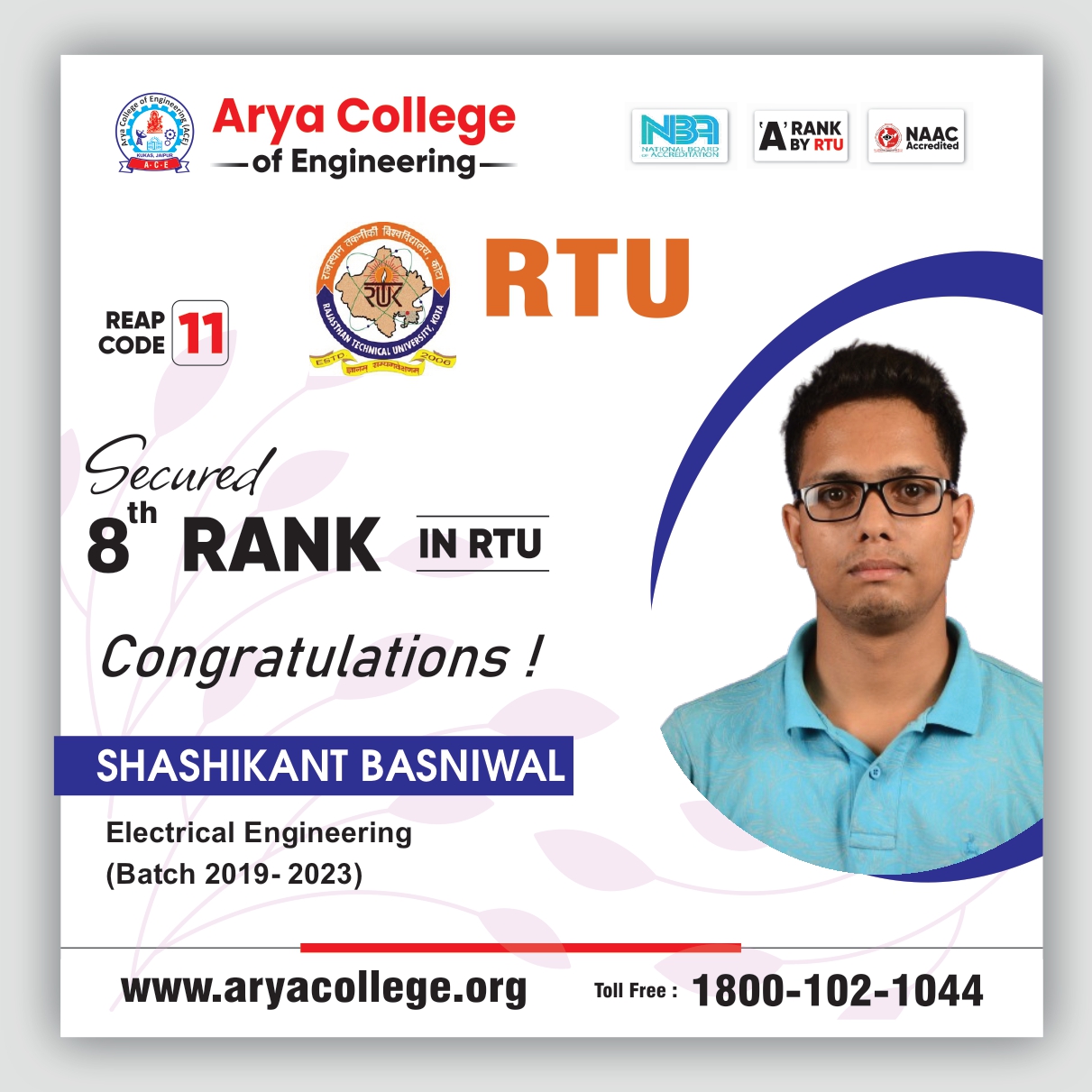


PROGRAM EDUCATION OBJECTIVE
I. Preparation:-
To prepare undergraduate students with appropriate blend of theoretical foundations, experimentation & technical implementation to comprehend and pinpoint problems in the field of electrical Engineering to excel in postgraduate programs or to succeed in industry / technical profession.
II. Core competence:-
To provide students with a solid foundation in mathematical, scientific and engineering fundamentals required to solve electrical engineering problems and also to pursue higher studies. Student will be able to employ his knowledge along with necessary techniques & tools for modern engineering applications.
III. Breadth:-
To train students with good scientific and electrical engineering breadth so as to comprehend, analyze, design, and create novel products and solutions for the real-life problems in the present electrical system.
IV. Professionalism:-
To inculcate in students professional and ethical attitude, Communication Skills, teamwork Skills, computer programming skill and an ability to relate electrical engineering issues to broader social context.
V. Learning Environment:-
To provide student with an academic environment aware of excellence, leadership, and the life-long learning needed for a successful professional career through independent studies, thesis, internships etc.
List of Program Outcomes
PO-1
Engineering Knowledge:
Apply knowledge of mathematics and science, with fundamentals of Engineering to be able to solve complex engineering problems related.
PO-2
Problem Analysis:
Identify, Formulate, review research literature and analyze complex engineering problems and reaching substantiated conclusions using first principles of mathematics, natural sciences and engineering sciences
PO-3
Design/Development of solutions:
Design solutions for complex engineering problems and design system components or processes that meet the specified needs with appropriate consideration for the public health and safety and the cultural societal and environmental considerations.
PO-4
Conduct Investigations of Complex problems:
Use research–based knowledge and research methods including design of experiments, analysis and interpretation of data, and synthesis of the information to provide valid conclusions.
PO-5
Modern Tool Usage:
Create, Select and apply appropriate techniques, resources and modern engineering and IT tools including prediction and modeling to complex engineering activities with an understanding of the limitations.
PO-6
The Engineer and Society:
Apply Reasoning informed by the contextual knowledge to assess societal, health, safety, legal and cultural issues and the consequent responsibilities relevant to the professional engineering practice.
PO-7
Environment and Sustainability:
Understand the impact of the professional engineering solutions in societal and environmental contexts sustainable development.
PO-8
Ethics:
Apply Ethical Principles and commit to professional ethics and responsibilities and norms of the engineering practice
PO-9
Individual and Team Work:
Function effectively as an individual and as a member or leader in diverse teams and in multidisciplinary Settings
PO-10
Communication:
Communicate effectively on complex engineering activities with the engineering community and with society at large such write effective reports and design documentation, make effective presentations and give and receive clear instructions.
PO-11
Project Management and Finance:
Demonstrate knowledge and understanding of the engineering management principles and apply these to one’s own work, as a member and leader in a team, to manage projects and in multi disciplinary environments.
PO-12
Life-Long Learning:
Recognize the need for and have the preparation and ability to engage in independent and life-long learning the broadest context of technological change.
Program Specific Outcome
PSO-1
Ability to utilize logical and technical skills to model, simulate and analyse electrical components and systems.
PSO-2
Empowering to provide socially acceptable technical solutions to real time electrical engineering problems with the application of modern and appropriate techniques for sustainable development.
Course Outcomes (COs)
| S.No. | Course Code | Course Title | Course Outcomes (COs) |
|---|---|---|---|
| 1 | 3EE2-01 | Advanced Engineering Mathematics |
|
| 2 | 3EE1-02 | Technical Communication |
|
| 3 | 3EE3-04 | Power Generation Process |
|
| 4 | 3EE4-05 | Electrical Circuit Analysis |
|
| 5 | 3EE4-06 | Analog Electronics |
|
| 6 | 3EE4-07 | Electrical Machine-I |
|
| 7 | 3EE4-08 | Electromegnetic Field |
|
| 8 | 3EE4-21 | Analog Electronics Lab |
|
| 9 | 3EE4-22 | ElectricalMachine-I Lab |
|
| 10 | 3EE4-23 | Electrical Circuit Design Lab |
|
| 11 | 4EE2-01 | Biology |
|
| 12 | 4EE1-03 | Managerial Economics and Financial Accounting |
|
| 13 | 4EE3-04 | Electronic Measurement & Instrumentation |
|
| 14 | 4EE4-05 | Electrical Machine -II |
|
| 15 | 4EE4-06 | Power Electronics |
|
| 16 | 4EE4-07 | Signals & Systems |
|
| 17 | 4EE4-08 | Digital Electronics |
|
| 18 | 4EE4-21 | Electrical Machine - II Lab |
|
| 19 | 4EE4-22 | Power Electronics Lab |
|
| 20 | 4EE4-23 | Digital Electronics Lab |
|
| 21 | 4EE3-24 | Computer Architecture |
|
| 22 | 5EE3-01 | Electrical Materials |
|
| 23 | 5EE4-02 | Power System-I |
|
| 24 | 5EE4-03 | Control System |
|
| 25 | 5EE4-04 | Microprocesor |
|
| 26 | 5EE4-05 | Electrical Machine Design |
|
| 27 | 5EE5-11 | Restructured Power System |
|
| 28 | 5EE4-21 | Power System -I Lab |
|
| 29 | 5EE4-22 | Control System lab |
|
| 30 | 5EE4-23 | Microprocesor Lab |
|
| 31 | 5EE4-24 | System Programming Lab |
|
| 32 | 5EE7-30 | Industrial Training |
|
| 33 | 6EE3-01 | Computer Architecture |
|
| 34 | 6EE4-02 | Power System -II |
|
| 35 | 6EE4-03 | Power System Protection |
|
| 36 | 6EE4-04 | Electrical Energy Conservation and Auditing |
|
| 37 | 6EE4-05 | Electrical Drives |
|
| 38 | 6EE5-11 | Power System Planning |
|
| 39 | 6EE4-21 | Power System - II Lab |
|
| 40 | 6EE4-22 | Electric Drive Lab |
|
| 41 | 6EE4-23 | Power System Protection Lab |
|
| 42 | 6EE4-24 | Modelling And Simulation Lab |
|
| 43 | 7EE5-11 | Wind and Solar Energy Systems. |
|
| 44 | 7ME6-60.2 | Quality Management |
|
| 45 | 7EE4-21 | Embedded Systems Lab |
|
| 46 | 7EE4-22 | Advance control system lab |
|
| 47 | 7EE7-30 | Industrial Training |
|
| 48 | 8EE4-11 | HVDC Transmission System |
|
| 49 | 8AG6-60.1 | Energy Management |
|
| 50 | 8EE4-21 | Energy Systems Lab |
|
| 51 | 8EE7-50 | Project |
|
Placements
| B.Tech 2022-Batch | |||||
|---|---|---|---|---|---|
| Placement List-2022 | |||||
| B.Tech 2021-Batch | |||||
|---|---|---|---|---|---|
| Placement List-2021 | |||||
| B.Tech 2019-2020 Batch | ||||
|---|---|---|---|---|
| S.No. | Year | Name | Roll No. | Company Name |
| 1 | 2019-2020 | ABHAY KUMAR | 16EAIEE002 | Capgemini |
| 2 | 2019-2020 | DHAWAL OZA | 16EAIEE018 | Capgemini |
| 3 | 2019-2020 | DRISHTY MAHAJAN | 16EAIEE019 | Capgemini |
| 4 | 2019-2020 | NEHA JANGID | 16EAIEE046 | Capgemini |
| 5 | 2019-2020 | PRASHANT PANDIT | 16EAIEE050 | Capgemini |
| 6 | 2019-2020 | SANJANA KUMAWAT | 16EAIEE061 | Capgemini |
| 7 | 2019-2020 | SHIVAM TINKER | 16EAIEE065 | Capgemini |
| 8 | 2019-2020 | RAJEEV KATYAYANI | 16EAIEE056 | Pinnacle Market |
| 9 | 2019-2020 | KISHAN LAL | 16EAIEE030 | Pinnacle Market |
| 10 | 2019-2020 | CHHOTU KUMAR | 16EAIEE014 | Pinnacle Market |
| 11 | 2019-2020 | HIMANSHU PAL | 16EAIEE026 | Pinnacle Market |
| 12 | 2019-2020 | JUHI SUMAN | 16EAIEE028 | Pinnacle Market |
| 13 | 2019-2020 | ANKIT KUMAR | 16EAIEE008 | Pinnacle Market |
| 14 | 2019-2020 | AMAN KUMAR | 16EAIEE005 | Genus Power |
| 15 | 2019-2020 | RAMESH KUMAR SHARMA | 16EAIEE058 | Pinnacle-2 |
| 16 | 2019-2020 | SACHIN SINGH | 16EAIEE203 | Rannlab |
| 17 | 2019-2020 | DEVKI NANDAN MEENA | 16EAIEE017 | Adastra Softwares |
| 18 | 2019-2020 | GIRIRAJ SHARMA | 16EAIEE021 | Adastra Softwares |
| 19 | 2019-2020 | HARSHIT SALVI | 16EAIEE023 | Adastra Softwares |
| 20 | 2019-2020 | KISHAN LAL MOGIA | 16EAIEE031 | Adastra Softwares |
| 21 | 2019-2020 | NISHANT TYAGI | 16EAIEE047 | Adastra Softwares |
| 22 | 2019-2020 | ASHISH FAGERIA | 16EAIEE010 | Dekho Network Pvt. Ltd. |
| 23 | 2019-2020 | GOVIND SINGH JADOUN | 16EAIEE022 | Dekho Network Pvt. Ltd. |
| 24 | 2019-2020 | LAXMI SAIN | 16EAIEE034 | Dekho Network Pvt. Ltd. |
| 25 | 2019-2020 | RAKESH SAINI | 16EAIEE057 | Dekho Network Pvt. Ltd. |
| 26 | 2019-2020 | KHUSHBOO GUPTA | 16EAIEE029 | Kukars Infotech |
| 27 | 2019-2020 | MADHURAM | 16EAIEE037 | Kukars Infotech |
| 28 | 2019-2020 | PAWAN SHARMA | 16EAIEE048 | Kukars Infotech |
| 29 | 2019-2020 | PRINCE KUMAWAT | 16EAIEE051 | Kukars Infotech |
| 30 | 2019-2020 | SATYENDRA KUMAR SHARMA | 16EAIEE063 | Kukars Infotech |
| 31 | 2019-2020 | KARAN DHAWARIYA | 16EAIEE400 | Kukars Infotech |
| 32 | 2019-2020 | IMRAN ANSARI | 16EAIEE027 | LBF Travel |
| 33 | 2019-2020 | MAHESH GAUTAM | 16EAIEE038 | LBF Travel |
| 34 | 2019-2020 | GANPAT LAL SAINI | 16EAIEE020 | Rannlab |
| 35 | 2019-2020 | RAVI KANT VERMA | 16EAIEE059 | Rannlab |
| B.Tech 2018-2019 Batch | ||||
|---|---|---|---|---|
| S.No. | Year | Name | Roll No. | Company Name |
| 1 | 2018-2019 | AJEET SINGH SHEKHAWAT | 15EAIEE007 | Arden Telecom |
| 2 | 2018-2019 | ANIKET TAK | 15EAIEE014 | Arden Telecom |
| 3 | 2018-2019 | KHUSHAL SHARMA | 15EAIEE052 | Arden Telecom |
| 4 | 2018-2019 | MD. ABU BAKER KHAN | 15EAIEE058 | Arden Telecom |
| 5 | 2018-2019 | MEGHAN SHARMA | 15EAIEE062 | Arden Telecom |
| 6 | 2018-2019 | PAWAN MEHRA | 15EAIEE078 | Arden Telecom |
| 7 | 2018-2019 | ATAL KUMAR SHARMA | 15EAIEE029 | Capgemini |
| 8 | 2018-2019 | HARSHIT AGARWAL | 15EAIEE045 | Capgemini |
| 9 | 2018-2019 | NIKHIL HARIYANI | 15EAIEE073 | Capgemini |
| 10 | 2018-2019 | SACHIN MANDAWRIYA | 15EAIEE100 | Capgemini |
| 11 | 2018-2019 | SANKALP SINGH SHEKHAWAT | 15EAIEE106 | Capgemini |
| 12 | 2018-2019 | ABHISHEK KUMAR | 15EAIEE300 | Capgemini |
| 13 | 2018-2019 | ROHIT KUMAR | 15EAIEE099 | Collabera |
| 14 | 2018-2019 | PRAKASH CHANDRA KUMAWAT | 15EAIEE082 | Genus Power |
| 15 | 2018-2019 | RAHUL SONI | 15EAIEE091 | IMS People |
| 16 | 2018-2019 | AJAY MEGHWAL | 15EAIEE005 | Optra Automation |
| 17 | 2018-2019 | NAGESH MEENA | 15EAIEE303 | Optra Automation |
| 18 | 2018-2019 | FEZAN ALI | 15EAIEE038 | Pinnacle |
| 19 | 2018-2019 | ASHISH KUMAR | 15EAIEE025 | Ripples |
| 20 | 2018-2019 | DEEPAK KUMAR | 15EAIEE035 | Ripples |
| 21 | 2018-2019 | MD SAEM | 15EAIEE059 | Ripples |
| 22 | 2018-2019 | AASHISH NAKUM | 15EAIEE002 | Wywid |
| 23 | 2018-2019 | AKSHAT GUPTA | 15EAIEE008 | Wywid |
| 24 | 2018-2019 | ANUP SHARMA | 15EAIEE019 | Wywid |
| 25 | 2018-2019 | ARVIND SINGH SODAWAT | 15EAIEE024 | Wywid |
| 26 | 2018-2019 | MINTU KUMAR | 15EAIEE063 | Wywid |
| 27 | 2018-2019 | SONU KUMAR | 15EAIEE110 | Wywid |
| 28 | 2018-2019 | KAMLESH KUMAR | 15EAIEE302 | Wywid |
| 29 | 2018-2019 | MOHD WASI | 16EAIEE201 | Wywid |
| B.Tech 2017-2018 Batch | ||||
|---|---|---|---|---|
| S.No. | Year | Name | Roll No. | Company Name |
| 1 | 2016-2017 | GOVIND SHARMA | 14EAIEE027 | Arden Telecom |
| 2 | 2017-2018 | HARDIK SHARMA | 14EAIEE028 | Arden Telecom |
| 3 | 2017-2018 | HARIOM KUMAR GUPTA | 14EAIEE030 | Arden Telecom |
| 4 | 2017-2018 | YASHU CHOUDHARY | 14EAIEE300 | CADD Centre |
| 5 | 2017-2018 | KULDEEP KUMAR | 15EAIEE204 | CADD Centre |
| 6 | 2017-2018 | AMIT KUMAR KEJRIWAL | 14EAIEE005 | Capgemini |
| 7 | 2017-2018 | AYUSH SHARMA | 14EAIEE016 | Capgemini |
| 8 | 2017-2018 | MUNAZZA SHAIKH | 14EAIEE058 | Capgemini |
| 9 | 2017-2018 | RAGHAV THAKUR | 14EAIEE072 | Capgemini |
| 10 | 2017-2018 | SHRADHA AGARWAL | 14EAIEE101 | Capgemini |
| 11 | 2017-2018 | KHUSHBOO VAISHNAV | 14EAIEE301 | Capgemini |
| 12 | 2017-2018 | NIKHIL MISHRA | 14EAIEE060 | CINIF |
| 13 | 2017-2018 | PINKY YADAV | 14EAIEE063 | CINIF |
| 14 | 2017-2018 | PIYUSH KUMAR | 14EAIEE064 | CINIF |
| 15 | 2017-2018 | PRADEEP SONTHWAL | 14EAIEE067 | CINIF |
| 16 | 2017-2018 | SARANSH SONI | 14EAIEE092 | CINIF |
| 17 | 2017-2018 | SHAHRUKH KHAN | 14EAIEE097 | CINIF |
| 18 | 2017-2018 | SUNNY SONI | 14EAIEE109 | CINIF |
| 19 | 2017-2018 | KANCHAN MEENA | 14EAIEE041 | Collabera |
| 20 | 2017-2018 | SAURAV KUMAR | 14EAIEE096 | Collabera |
| 21 | 2017-2018 | BHASKAR SHARMA | 14EAIEE018 | CURA Group |
| 22 | 2017-2018 | BRHMDEV BIJRANIYA | 14EAIEE020 | CURA Group |
| 23 | 2017-2018 | DEEPAK KUMAR CHOUDHARY | 14EAIEE021 | CURA Group |
| 24 | 2017-2018 | DEVENDRA PRATAP SINGH CHOUHAN | 14EAIEE022 | CURA Group |
| 25 | 2017-2018 | DILIP KUMAR TALWARA | 14EAIEE023 | CURA Group |
| 26 | 2017-2018 | DIVANSHU MUDGAL | 14EAIEE024 | CURA Group |
| 27 | 2017-2018 | SAIF ALI CHOUHAN | 14EAIEE090 | CURA Group |
| 28 | 2017-2018 | TEJ SINGH RATHORE | 14EAIEE111 | CURA Group |
| 29 | 2017-2018 | ABHISHEK KUMAWAT | 14EAIEE001 | Dekho |
| 30 | 2017-2018 | ABHISHEK NAYAK | 14EAIEE002 | Dekho |
| 31 | 2017-2018 | AMAN SHARMA | 14EAIEE004 | Dekho |
| 32 | 2017-2018 | AMIT KUMAR KULDEEP | 14EAIEE006 | EPIC |
| 33 | 2017-2018 | AMRIT SINGH | 14EAIEE007 | EPIC |
| 34 | 2017-2018 | ANJANA SHARMA | 14EAIEE008 | EPIC |
| 35 | 2017-2018 | ANKUR SHARMA | 14EAIEE009 | EPIC |
| 36 | 2017-2018 | ASHIF KHAN | 14EAIEE011 | EPIC |
| 37 | 2017-2018 | ASHISH RANJAN KUMAR | 14EAIEE013 | EPIC |
| 38 | 2017-2018 | ASHISH SHARMA | 14EAIEE014 | EPIC |
| 39 | 2017-2018 | BABU SAHEB | 14EAIEE017 | EPIC |
| 40 | 2017-2018 | VIVEK PATHAK | 14EAIEE117 | EPIC |
| 41 | 2017-2018 | ASHISH DODIYAR | 14EAIEE012 | eUniversal |
| 42 | 2017-2018 | LOKESH NAGAR | 14EAIEE047 | eUniversal |
| 43 | 2017-2018 | KRISHAN BHAN SINGH | 14EAIEE045 | FACE |
| 44 | 2017-2018 | VINITA CHOUBISA | 14EAIEE304 | FACE |
| 45 | 2017-2018 | HARDIK SHARMA | 14EAIEE028 | Informatics |
| 46 | 2017-2018 | KESHAV RAJ PUROHIT | 14EAIEE042 | Informatics |
| 47 | 2017-2018 | DEVENDRA PRATAP SINGH CHOUHAN | 14EAIEE022 | Snappyhire |
| 48 | 2017-2018 | HARSH VARDHAN TRIPATHI | 14EAIEE031 | UA Automation |
| 49 | 2017-2018 | BHUVNESH AGARWAL | 14EAIEE019 | Wywid |
| 50 | 2017-2018 | HEMANT SHARMA | 14EAIEE032 | Wywid |
| 51 | 2017-2018 | HEMANT SINGH RAO | 14EAIEE033 | Wywid |
| 52 | 2017-2018 | HAMLATA VERMA | 14EAIEE034 | Wywid |
| 53 | 2017-2018 | KAMLESH MALI | 14EAIEE040 | Wywid |
| 54 | 2017-2018 | MITHU MANDAL | 14EAIEE054 | Wywid |
| 55 | 2017-2018 | PREETAM SINGH | 14EAIEE069 | Wywid |
| 56 | 2017-2018 | RANJEET KUMAR | 14EAIEE080 | Wywid |
| 57 | 2017-2018 | SAURABH SHARMA | 14EAIEE095 | Wywid |
| 58 | 2017-2018 | DEVANSHA PAREEK | 14EAIEE302 | Wywid |
| 59 | 2017-2018 | SOHAN SINGH | 14EAIEE406 | Wywid |
| 60 | 2017-2018 | KUSH SHARMA | 15EAIEE205 | Wywid |
| B.Tech 2016-2017 Batch | ||||
|---|---|---|---|---|
| S.No. | Year | Name | Roll No. | Company Name |
| 1 | 2016-2017 | PIYUSH PAREEK | 13EAIEE741 | Capgemini |
| 2 | 2016-2017 | VARUN KUMAR | 13EAIEE760 | Capgemini |
| 3 | 2016-2017 | ACHLA RENWAL | 13EAIEE009 | Kukars |
| 4 | 2016-2017 | VIRENDRA SINGH SISODIYA | 13EAIEE122 | Habile Labs |
| 5 | 2016-2017 | DHARMVEER | 13EAIEE032 | Wywid |
| 6 | 2016-2017 | ANKIT KUMAR JHA | 13EAIEE708 | Wywid |
| 7 | 2016-2017 | ABHIJEET YADAV | 13EAIEE005 | dekho |
| 8 | 2016-2017 | ABHISHEK SINGH BHATI | 13EAIEE007 | dekho |
| 9 | 2016-2017 | ABHISHEK VERMA | 13EAIEE008 | dekho |
| 10 | 2016-2017 | AKHIL KUMAR | 13EAIEE011 | dekho |
| 11 | 2016-2017 | AKHILESH SHARMA | 13EAIEE012 | dekho |
| 12 | 2016-2017 | AMAR | 13EAIEE015 | dekho |
| 13 | 2016-2017 | YENA BISHNOI | 13EAIEE126 | Amazon |
| 14 | 2016-2017 | YASH VARDHAN | 13EAIEE762 | Amazon |
| 15 | 2016-2017 | SHAHEER SUFYAN | 13EAIEE93 | Amazon |
| 16 | 2016-2017 | RAHUL KUMAR | 13EAIEE745 | Amazon |
| 17 | 2016-2017 | KIRTIRAJ NAIK | 13EAIEE728 | Amazon |
| 18 | 2016-2017 | NIPENDER SINGH | 13EAIEE068 | Just Dial |
| 19 | 2016-2017 | AAKASH TIWARI | 13EAIEE002 | Epic Research |
| 20 | 2016-2017 | RITVIK SHARMA | 13EAIEE749 | Epic Research |
| 21 | 2016-2017 | ABDUL VALEED | 13EAIEE003 | Epic Research |
| 22 | 2016-2017 | SANJAY KUMAR YADAV | 13EAIEE750 | Epic Research |
| 23 | 2016-2017 | VISHAL SINGH | 13EAIEE123 | Epic Research |
| 24 | 2016-2017 | MIHIR KUMAR SINGH | 13EAIEE062 | Amazon |
| 25 | 2016-2017 | AAKASH JUNEJA | 13EAIEE001 | Artech |
| 26 | 2016-2017 | AMIT KUMAR | 13EAIEE703 | Arden Telecom |
| 27 | 2016-2017 | ADITYA KUMAR | 13EAIEE010 | Arden Telecom |
| 28 | 2016-2017 | NISCHAY JAIN | 13EAIEE070 | Arden Telecom |
| 29 | 2016-2017 | DIL VIJAY KUMAR | 13EAIEE033 | Arden Telecom |
| 30 | 2016-2017 | DHANANJAY SHARMA | 13EAIEE029 | Arden Telecom |
| 31 | 2016-2017 | DEEPAK KUMAR | 13EAIEE026 | Arden Telecom |
| 32 | 2016-2017 | VIKKY KUMAR | 13EAIEE118 | Arden Telecom |
| 33 | 2016-2017 | SUMIT KUMAR | 13EAIEE106 | Arden Telecom |
| 34 | 2016-2017 | HEMANT KUMAR SHARMA | 13EAIEE041 | Tech Mahindra |
| 35 | 2016-2017 | DEEPAK YADAV | 13EAIEE717 | Tech Mahindra |
| 36 | 2016-2017 | ARJUN SINGH | 13EAIEE710 | Sunwaves |
| 37 | 2016-2017 | JEETENDRA KUMAR | 13EAIEE853 | Sunwaves |
| 38 | 2016-2017 | RAVI RATHOR | 13EAIEE086 | Sunwaves |
| 39 | 2016-2017 | SIKANDAR KHAN | 13EAIEE102 | Sunwaves |
| 40 | 2016-2017 | HARI NARAYAN SWAMI | 13EAIEE040 | Sunwaves |
| 41 | 2016-2017 | DHARMENDRA KR. VERMA | 13EAIEE031 | Sunwaves |
| 42 | 2016-2017 | MOHIT SINGH | 13EAIEE738 | Sunwaves |
| 43 | 2016-2017 | KRISHAN RAJ | 13EAIEE050 | Consultadd |
| 44 | 2016-2017 | SHUBHAM DWIVEDI | 13EAIEE753 | Consultadd |
| 45 | 2016-2017 | ANKIT MALI | 13EAIEE018 | Consultadd |
| 46 | 2016-2017 | PRAVEEN SHAH | 13EAIEE074 | Cape Electric |
| 47 | 2016-2017 | GOURANG GUPTA | 13EAIEE039 | Cape Electric |
| 48 | 2016-2017 | ASTHA AGARWAL | 13EAIEE024 | Cape Electric |
| 49 | 2016-2017 | JUNAID ANSARI | 13EAIEE045 | Cape Electric |
| 50 | 2016-2017 | KUMARI SANDHYA RANI | 13EAIEE051 | Cape Electric |
| 51 | 2016-2017 | SHUBHAM KUMAR SONI | 13EAIEE754 | Cape Electric |
| 52 | 2016-2017 | VINOD RUNDLA | 13EAIEE120 | Cape Electric |
| 53 | 2016-2017 | MD BAHAUDDIN | 13EAIEE734 | Cape Electric |
| 54 | 2016-2017 | ASHISH KUMAR SUWALKA | 13EAIEE020 | Cape Electric |
| 55 | 2016-2017 | MEHUL SINGH JADOUN | 13EAIEE735 | Cape Electric |
| B.Tech 2015-2016 Batch | ||||
|---|---|---|---|---|
| S.No. | Year | Name | Roll No. | Company Name |
| 1 | 2015-2016 | BHOJRAJ SINGH | 12EAIEE029 | TCS |
| 2 | 2015-2016 | JITENDER SINGH | 12EAIEE061 | TCS |
| 3 | 2015-2016 | MOHAMMED FARHAJ | 12EAIEE077 | TCS |
| 4 | 2015-2016 | PRADEEP PRAJAPAT | 12EAIEE087 | TCS |
| 5 | 2015-2016 | PRAKAMYA SHARMA | 12EAIEE088 | TCS |
| 6 | 2015-2016 | SHABA HASAN | 12EAIEE110 | TCS |
| 7 | 2015-2016 | SHUBHAM SHRIMAL | 12EAIEE753 | TCS |
| 8 | 2015-2016 | GARIMA YADAV | 12EAIEE0043 | Tech Mahindra |
| 9 | 2015-2016 | BHAVESH PANCHAL | 12EAIEE028 | Good Through Software |
| 10 | 2015-2016 | KARTIK TAK | 12EAIEE064 | JK Machines |
| 11 | 2015-2016 | AVINASH GUPTA | 12EAIEE008 | JK Machines |
| 12 | 2015-2016 | AATISH KUMAR JAIN | 12EAIEE001 | JK Machines |
| 13 | 2015-2016 | ABHISHEK CHOUDHARY | 12EAIEE003 | JK Machines |
| 14 | 2015-2016 | ABHISHEK TANWAR | 12EAIEE004 | JK Machines |
| 15 | 2015-2016 | SAURAV CHOUDHARY | 12EAIEE749 | Prolifics |
| 16 | 2015-2016 | RUCHI DANGI | 12EAIEE351 | Prolifics |
| 17 | 2015-2016 | VIJENDER SINGH RATHORE | 12EAIEE758 | Collabera |
| 18 | 2015-2016 | JITENDRA SHARMA | 12EAIEE063 | CMS IT Services Pvt. Ltd |
| 19 | 2015-2016 | DASHRATH KALAL | 12EAIEE713 | CMS IT Services Pvt. Ltd |
| 20 | 2015-2016 | AJAY SAINI | 12EAIEE005 | CMS IT Services Pvt. Ltd |
| 21 | 2015-2016 | AJAY SINGH CHOUDHARY | 12EAIEE006 | CMS IT Services Pvt. Ltd |
| 22 | 2015-2016 | AKSHAY BAGRA | 12EAIEE007 | CMS IT Services Pvt. Ltd |
| 23 | 2015-2016 | AMAN KUMAR SINGHAL | 12EAIEE008 | CMS IT Services Pvt. Ltd |
| 24 | 2015-2016 | AMIT KUMAR | 12EAIEE009 | CMS IT Services Pvt. Ltd |
| 25 | 2015-2016 | AMRIT SRIVASTAVA | 12EAIEE011 | CMS IT Services Pvt. Ltd |
| 26 | 2015-2016 | ANIL KUMAR | 12EAIEE012 | CMS IT Services Pvt. Ltd |
| 27 | 2015-2016 | ANIL KUMAR DHAKAD | 12EAIEE013 | CMS IT Services Pvt. Ltd |
| 28 | 2015-2016 | ANIL KUMAR RAIBARI | 12EAIEE014 | CMS IT Services Pvt. Ltd |
| 29 | 2015-2016 | ANKIT GAUR | 12EAIEE015 | CMS IT Services Pvt. Ltd |
| 30 | 2015-2016 | GUMAN SINGH | 12EAIEE050 | Capgemini |
| 31 | 2016-2017 | VIVEK GUPTA | 12EAIEE126 | HCL Technologies |
| 32 | 2015-2016 | JITENDRA KUMAR | 12EAIEE726 | Maintec Technologies |
| 33 | 2015-2016 | SHANKAR SINGH TANWAR | 12EAIEE303 | Arden Telecom |
| 34 | 2015-2016 | SHIWANI LAKHERWAL | 12EAIEE141 | Arden Telecom |
| 35 | 2015-2016 | RAGHUVEER SINGH CHAUHAN | 12EAIEE093 | Arden Telecom |
| 36 | 2015-2016 | RAHUL KUMAWAT | 12EAIEE744 | Arden Telecom |
| 37 | 2015-2016 | DOLLY MURODIA | 12EAIEE041 | Arden Telecom |
| 38 | 2015-2016 | DIKSHA TAMBI | 12EAIEE037 | Arden Telecom |
| 39 | 2015-2016 | VIKAS SHARMA | 12EAIEE760 | Cyfuture |
| 40 | 2015-2016 | ASHWANI YADAV | 12EAIEE709 | Cyfuture |
| 41 | 2015-2016 | GAURAV KUMAR | 12EAIEE45 | Cyfuture |
| 42 | 2015-2016 | DILIP SINGH TANWAR | 12EAIEE716 | Cyfuture |
| 43 | 2015-2016 | ARTI KOLI | 12EAIEE019 | Cyfuture |
| 44 | 2015-2016 | RAJAT PARASAR | 12EAIEE095 | Cyfuture |
| 45 | 2015-2016 | GAJENDRA CHOUDHARY | 12EAIEE718 | CINIF Technologies |
| 46 | 2015-2016 | GAUTAM KUMAR | 12EAIEE046 | Amazon |
| 47 | 2016-2017 | AMIT VASWANI | 12EAIEE010 | Amazon |
| 48 | 2015-2016 | ANKIT KUMAR BANSAL | 12EAIEE016 | Amazon |
| 49 | 2015-2016 | ANKIT SONI | 12EAIEE017 | Amazon |
| 50 | 2015-2016 | ARBAZ KHAN | 12EAIEE018 | Amazon |
| 51 | 2015-2016 | ARVIND CHANWALA | 12EAIEE020 | Amazon |
| 52 | 2015-2016 | RAMAN KUMAR JHA | 12EAIEE121 | Westin Electromech |
| 53 | 2015-2016 | YASHPAL SINGH | 12EAIEE762 | Westin Electromech |
| 54 | 2015-2016 | MONU SHARMA | 12EAIEE078 | Westin Electromech |
| 55 | 2015-2016 | MANISH KUMAR (SC) | 12EAIEE072 | Westin Electromech |
| 56 | 2016-2017 | ASHOK KUMAR (OP) | 12EAIEE021 | Westin Electromech |
| 57 | 2015-2016 | ASHOK KUMAR (RP) | 12EAIEE022 | Westin Electromech |
| 58 | 2015-2016 | IDRISH MIA | 12EAIEE058 | Shriram Transport Finance |
| 59 | 2015-2016 | ASHOK KUMAR REGAR | 12EAIEE023 | Shriram Transport Finance |
| 60 | 2015-2016 | DAMODAR SAINI | 12EAIEE031 | CADD Centre |
| 61 | 2015-2016 | GIRRAJ JAIN | 12EAIEE049 | CADD Centre |
| 62 | 2015-2016 | HITENDRA CHOUDHARY | 12EAIEE056 | CADD Centre |
| 63 | 2015-2016 | MALAY SHARMA | 12EAIEE069 | CADD Centre |
| 64 | 2015-2016 | MILAN MANDOWARA | 12EAIEE076 | CADD Centre |
| 65 | 2015-2016 | PINTU SAINI | 12EAIEE084 | CADD Centre |
| 66 | 2015-2016 | DHANANJAYA KUMAR | 12EAIEE715 | CADD Centre |
| 67 | 2015-2016 | SHAILENDRA KUMAR THAKUR | 12EAIEE750 | CADD Centre |
| 68 | 2015-2016 | YUVRAJ SINGH | 12EAIEE763 | CADD Centre |
| 69 | 2015-2016 | ASHU SINGHAL | 12EAIEE024 | Consultadd |
| 70 | 2015-2016 | ATUL | 12EAIEE025 | Consultadd |
| 71 | 2015-2016 | KOVID MOURYA | 12EAIEE302 | HCL (TSS) |
| 72 | 2015-2016 | SATYA PRAKASH YADAV | 12EAIEE109 | HCL (TSS) |
| 73 | 2015-2016 | AJAY SAINI | 12EAIEE005 | Dekho Network |
| 74 | 2015-2016 | AMIT | 12EAIEE702 | eUniversal |
| 75 | 2015-2016 | SHUBHAM JAIN | 12EAIEE115 | eUniversal |
| 76 | 2015-2016 | BIKRAMADITYA | 12EAIEE030 | eUniversal |
| 77 | 2015-2016 | MANGAL CHAND KAHAR | 12EAIEE729 | eUniversal |
| 78 | 2015-2016 | LAKSHYA AGARWAL | 12EAIEE727 | eUniversal |
| 79 | 2015-2016 | ANAND MOHAN | 12EAIEE705 | eUniversal |
| 80 | 2015-2016 | NEERAJ KUMAR | 12EAIEE738 | eUniversal |
| 81 | 2015-2016 | DHARAMRAJ MEENA | 12EAIEE036 | eUniversal |
| 82 | 2015-2016 | JITENDRA KUMAR SANKHALA | 12EAIEE062 | eUniversal |
| 83 | 2015-2016 | MANOJ KUMAR MAHAWAR | 12EAIEE073 | eUniversal |
| 84 | 2015-2016 | NIRAJ KUMAR | 12EAIEE081 | eUniversal |
| 85 | 2015-2016 | RAVI KUMAR SINGH | 12EAIEE307 | Good Through Software |
| 86 | 2015-2016 | YASH PATHAK | 12EAIEE312 | Arden Telecom |
| 87 | 2015-2016 | SADDAM HUSAIN | 12EAIEE309 | CADD Centre |
| B.Tech 2014-2015 Batch | ||||
|---|---|---|---|---|
| S.No. | Year | Name | Roll No. | Company Name |
| 1 | 2014-2015 | PRATYUSH UPADHAYAY | 11EAIEE737 | L&T Infotech |
| 2 | 2014-2015 | ARVIND KUMA JANGID | 11EAIEE002 | CADD Centre |
| 3 | 2014-2015 | ASHISH ANAND | 11EAIEE003 | CADD Centre |
| 4 | 2014-2015 | ASHISH KUMAR CHHAMUNYA | 11EAIEE004 | CADD Centre |
| 5 | 2014-2015 | PRAMOD SINGH CHAUDHARY | 11EAIEE042 | CADD Centre |
| 6 | 2014-2015 | PUKHRAJ BUGALIYA | 11EAIEE043 | CADD Centre |
| 7 | 2014-2015 | RAJENDRA SINGH BHATI | 11EAIEE044 | CADD Centre |
| 8 | 2014-2015 | RAJESH KUMAR SHARMA | 11EAIEE045 | CADD Centre |
| 9 | 2014-2015 | RAKESH KUMAR | 11EAIEE046 | CADD Centre |
| 10 | 2014-2015 | RANDHIR KUMAR | 11EAIEE047 | CADD Centre |
| 11 | 2014-2015 | SHARIQUE ZAFAR | 11EAIEE048 | CADD Centre |
| 12 | 2014-2015 | SUJEET KUMAR GURJAR | 11EAIEE050 | CADD Centre |
| 13 | 2014-2015 | SURENDRA KUMAR YADAV | 11EAIEE052 | CADD Centre |
| 14 | 2014-2015 | SWATI SHARMA | 11EAIEE054 | CADD Centre |
| 15 | 2014-2015 | HEMANT KUMAR RATHORE | 11EAIEE020 | CADD Centre |
| 16 | 2014-2015 | BHANU PRAKASH SONI | 11EAIEE009 | Mindtree |
| 17 | 2014-2015 | CHAKRAVIR SINGH | 11EAIEE011 | Mindtree |
| 18 | 2014-2015 | ARTI SHARMA | 11EAIEE001 | Infosemi Technologies |
| 19 | 2014-2015 | HARDIK PANCHAL | 11EAIEE019 | Infosemi Technologies |
| 20 | 2014-2015 | LAXMAN LAL JAT | 11EAIEE028 | Collabera |
| 21 | 2014-2015 | LOKENDRA SINGH | 11EAIEE029 | Collabera |
| 22 | 2014-2015 | MAHENDRA KUMAR YADAV | 11EAIEE030 | Collabera |
| 23 | 2014-2015 | MAHESH KUMAR BOHARA | 11EAIEE031 | Collabera |
| 24 | 2014-2015 | KULDEEP KUMAR | 11EAIEE301 | Siemens |
| 25 | 2014-2015 | KULDEEP MITHARWAL | 11EAIEE025 | Siemens |
| 26 | 2014-2015 | ATUL AMETA | 11EAIEE007 | Siemens |
| 27 | 2014-2015 | KAMAL KISHOR | 11EAIEE021 | Remson Appliances |
| 28 | 2014-2015 | KUMAR SANIDHYA | 11EAIEE026 | Remson Appliances |
| 29 | 2014-2015 | GOVIND NATH | 11EAIEE018 | Merchant Navy |
| 30 | 2014-2015 | PANKAJ SINGH CHOUHAN | 11EAIEE040 | Merchant Navy |
| 31 | 2014-2015 | SHOBHIT KUMAR SHARMA | 11EAIEE049 | Merchant Navy |
| 32 | 2014-2015 | TRILOK CHAND YADAV | 11EAIEE056 | Merchant Navy |
| 33 | 2014-2015 | KANISHKA | 11EAIEE022 | Merchant Navy |
| 34 | 2014-2015 | GAURAV NAMDEV | 11EAIEE016 | Merchant Navy |
| 35 | 2014-2015 | DINESH AGARWAL | 11EAIEE014 | Merchant Navy |
| 36 | 2014-2015 | BRAJRAJ KUSHWAH | 11EAIEE010 | Merchant Navy |
| 37 | 2014-2015 | CHOUHAL SINGH | 11EAIEE012 | Adastra |
| 38 | 2014-2015 | DHARMESH VAISHNAV | 11EAIEE013 | Adastra |
| 39 | 2014-2015 | ANKIT RATHORE | 11EAIEE704 | ARN Infotel |
| 40 | 2014-2015 | DINESH KUMAR | 11EAIEE015 | Kukars |
| 41 | 2014-2015 | GAURAV SINGH | 11EAIEE017 | Kukars |
| 42 | 2014-2015 | MAHIPAL | 11EAIEE032 | PC Solution |
| 43 | 2014-2015 | MOHIT SONI | 11EAIEE033 | PC Solution |
| 44 | 2014-2015 | NARENDRA SINGH CHOUHAN | 11EAIEE036 | Emicon |
| 45 | 2014-2015 | PRAMOD KUMAR SHARMA | 11EAIEE041 | Emicon |
| 46 | 2014-2015 | SUNIL YADAV | 11EAIEE051 | HCL Talent Care |
| 47 | 2014-2015 | SUBHASH DAGAR | 11EAIEE754 | Ericsson |
| 48 | 2014-2015 | UMESH MANGAL | 11EAIEE057 | Ericsson |
| 49 | 2014-2015 | ASHOK KUMAWAT | 11EAIEE005 | Ericsson |
| 50 | 2014-2015 | ASHUTOSH RAJ | 11EAIEE006 | Ericsson |
| B.Tech 2013-2014 Batch | ||||
|---|---|---|---|---|
| S.No. | Year | Name | Roll No. | Company Name |
| 1 | 2013-2014 | AMRENDRA KUMAR | 10EAIEE009 | Merchant Navy |
| 2 | 2013-2014 | ANKIT SHARMA | 10EAIEE011 | Merchant Navy |
| 3 | 2013-2014 | MOHIT BISHT | 10EAIEE035 | Merchant Navy |
| 4 | 2013-2014 | RAJVARDHAN SINGH CHUNDAWAT | 10EAIEE042 | Merchant Navy |
| 5 | 2013-2014 | ANKIT GOYAL | 10EAIEE702 | Merchant Navy |
| 6 | 2013-2014 | ANSHU KHANDELWAL | 10EAIEE705 | Merchant Navy |
| 7 | 2013-2014 | HIMANSHU SHARMA | 10EAIEE718 | Merchant Navy |
| 8 | 2013-2014 | PRATAP SINGH PRATIHAR | 10EAIEE733 | Merchant Navy |
| 9 | 2013-2014 | VIRENDRA SINGH | 10EAIEE755 | Merchant Navy |
| 10 | 2013-2014 | VISHAL KUMAR | 10EAIEE756 | Merchant Navy |
| 11 | 2013-2014 | MUKESH KUMAR SESMA | 10EAIEE036 | Merchant Navy |
| 12 | 2013-2014 | RAVINDRA SINGHAL | 10EAIEE046 | Merchant Navy |
| 13 | 2013-2014 | SUNIL SONI | 10EAIEE057 | Merchant Navy |
| 14 | 2013-2014 | ABHINAV SHARMA | 10EAIEE004 | JK Technosoft |
| 15 | 2013-2014 | AJAY SHREEVAS | 10EAIEE005 | JK Technosoft |
| 16 | 2013-2014 | SACHIT MODI | 10EAIEE049 | JK Technosoft |
| 17 | 2013-2014 | NADEEM SHABHA MANSURI | 10EAIEE731 | Alpha Nine |
| 18 | 2013-2014 | ARVIND KUMAR | 10EAIEE014 | Alpha Nine |
| 19 | 2013-2014 | BHARAT KUMAR PRAJAPATI | 10EAIEE709 | CADD Centre |
| 20 | 2013-2014 | DARSHAN PANCHAL | 10EAIEE712 | CADD Centre |
| 21 | 2013-2014 | DHARMVEER SUMAN | 10EAIEE715 | CADD Centre |
| 22 | 2013-2014 | LALIT TIWARI | 10EAIEE725 | CADD Centre |
| 23 | 2013-2014 | SHASHANK PANDIT | 10EAIEE745 | CADD Centre |
| 24 | 2013-2014 | HIMANSHU TANWAR | 10EAIEE025 | CADD Centre |
| 25 | 2013-2014 | NAROTTAM JANGIR | 10EAIEE037 | CADD Centre |
| 26 | 2013-2014 | PRATEEK GOYAL | 10EAIEE040 | CADD Centre |
| 27 | 2013-2014 | VISHAL SINGH JHALA | 10EAIEE757 | Cognizant |
| 28 | 2013-2014 | SURYA PRAKASH SHARMA | 10EAIEE750 | Collabera |
| 29 | 2013-2014 | TARUN GOYAL | 10EAIEE751 | Collabera |
| 30 | 2013-2014 | TARUN KUMAR GUPTA | 10EAIEE752 | Collabera |
| 31 | 2013-2014 | TRILOKI NATH PANDIT | 10EAIEE753 | Collabera |
| 32 | 2013-2014 | VIJAY KUMAR PANDEY | 10EAIEE754 | Collabera |
| 33 | 2013-2014 | VISHNU KUMAR RATHOD | 10EAIEE758 | Collabera |
| 34 | 2013-2014 | YOGIT MARU | 10EAIEE759 | Collabera |
| 35 | 2013-2014 | YUDHISTIR PANCHAL | 10EAIEE760 | Collabera |
| 36 | 2013-2014 | RAHUL KUMAR | 10EAIEE041 | Tech Mahindra |
| 37 | 2013-2014 | RAVI SHARMA | 10EAIEE044 | Tech Mahindra |
| 38 | 2013-2014 | ABHISHEK KUMAR | 10EAIEE002 | TCS |
| 39 | 2013-2014 | ANIL KUMAR SAINI | 10EAIEE010 | TCS |
| 40 | 2013-2014 | ROHITASH SHARMA | 10EAIEE048 | HCL Slocum |
| 41 | 2013-2014 | ASHISH SHARMA | 10EAIEE707 | HCL Slocum |
| 42 | 2013-2014 | CHANDRA PRAKASH JANGIR | 10EAIEE018 | HCL Slocum |
| 43 | 2013-2014 | HARI SHANKAR KUMHAR | 10EAIEE023 | HCL Slocum |
| 44 | 2013-2014 | KAILASH CHAND JANGID | 10EAIEE026 | HCL Slocum |
| 45 | 2013-2014 | KRITI KUMARI SHAH | 10EAIEE029 | HCL Slocum |
| 46 | 2013-2014 | ANKIT SHARMA | 10EAIEE012 | Infosys |
| 47 | 2013-2014 | SANDEEP KUMAR RANWA | 10EAIEE051 | HCL Technology |
| 48 | 2013-2014 | SANJAY KUMAR SAIN | 10EAIEE052 | HCL Technology |
| 49 | 2013-2014 | SANKALP AGRAWAL | 10EAIEE054 | HCL Technology |
| 50 | 2013-2014 | MANISH KUMAR | 10EAIEE730 | Syntel |
| 51 | 2013-2014 | SUMITKUMAR SINGH | 10EAIEE749 | Adastra |
| 52 | 2013-2014 | SOYAL KHAN | 10EAIEE748 | Adastra |
| 53 | 2013-2014 | SHYAM SUNDER AGARWAL | 10EAIEE746 | Adastra |
| 54 | 2013-2014 | SIDDHARTH BHAWSAR | 10EAIEE747 | Adastra |
| 55 | 2013-2014 | ABHILASHA BHARTI | 10EAIEE003 | Adastra |
| 56 | 2013-2014 | AJAY SINGHAL | 10EAIEE006 | Adastra |
| 57 | 2013-2014 | TARUN TANWAR | 10EAIEE059 | Adastra |
| 58 | 2013-2014 | TRIBHUWAN JOSHI | 10EAIEE060 | Adastra |
| 59 | 2013-2014 | KAILASH KUMAR NAGAR | 10EAIEE027 | Kukars |
| 60 | 2013-2014 | AMAR SINGH SHAKTAWAT | 10EAIEE008 | Ericsson |
| 61 | 2013-2014 | GAURAV VIJAYVARGIYA | 10EAIEE021 | Ericsson |
| 62 | 2013-2014 | PANKAJ KUAMR GUPTA | 10EAIEE732 | Ericsson |
| 63 | 2013-2014 | RANDHIR KUMAR | 10EAIEE043 | Ericsson |
| 64 | 2013-2014 | MOHAMMAD SALMAN | 10EAIEE034 | Ericsson |
| 65 | 2013-2014 | VIRAMGAMA JATIN JAGDISH BHAI | 11EAIEE210 | Inopen Technologies |
| 66 | 2013-2014 | DEVENDRA KUMAR | 10EAIEE761 | Collabera |
Industrial Collaboration:
Projects
The department has successfully completed projects on:
Students of this department have been able to secure campus placements in many reputed companies at lucrative packages. A few are following:
Industrial Tours & Trainings:
Impressive Results:
Faculties take extra care of the students in the knowledge delivery process throughout the course period. These dedicated and concentrated efforts have culminated in obtaining 100 % results in the final year. During the last three years, this department of has successfully achieved 100% results.
Conference/seminar and workshops:
Arya College has been a ogranized various National and International Conferences/ Seminars and Workshops Including the following





